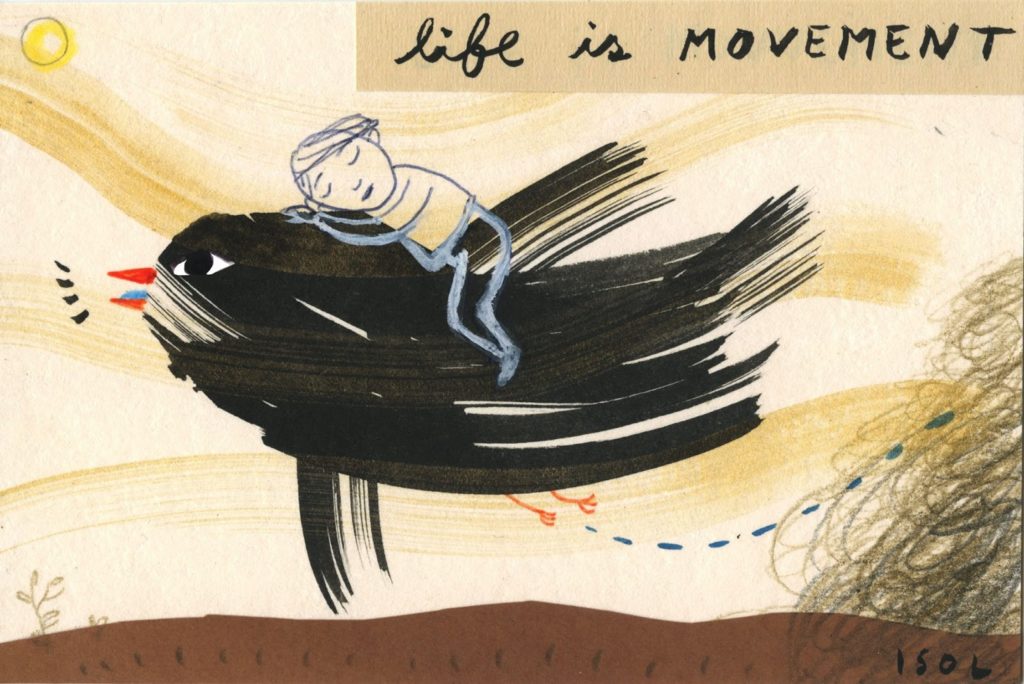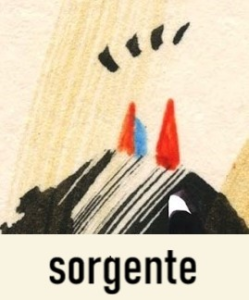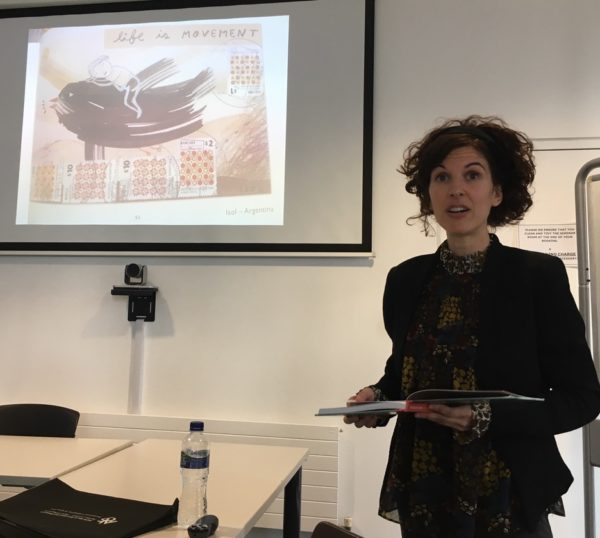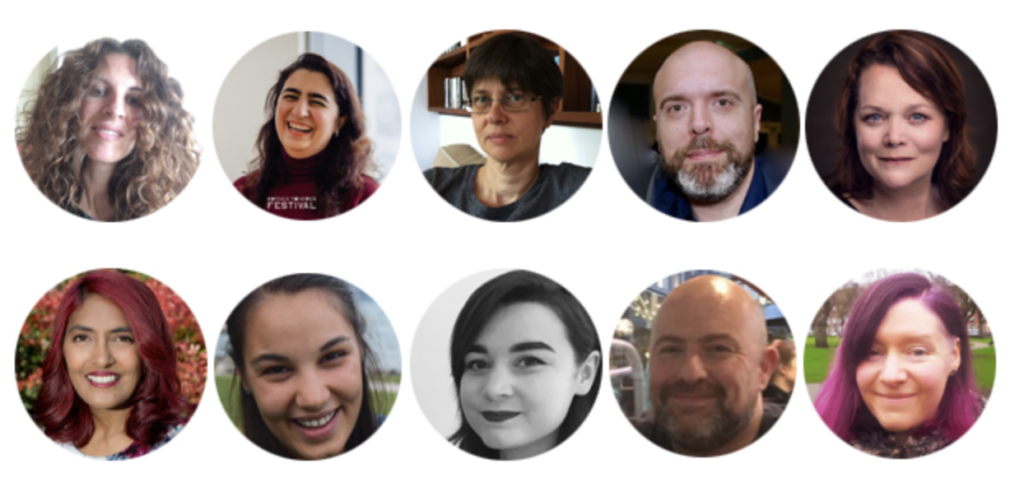
Sorgente is a research project that seeks to explore the connection(s) between performative language teaching, motivation to belong and second language learning, with students from refugee and migrant backgrounds, and their teachers. Download the research report here
Our practice is inspired by imagery from the project Migrations: Open Hearts, Open Borders.
In the preface to the illustrated collection, illustrator Shawn Tan writes: “All migration is an act of imagination, a flight of the imagination.”
Like migration, language learning is a flight of the imagination. And, just like migration, language learning requires a stretch towards the unfamiliar.
Visual Arts.
Creative Writing.
Improv.
Voice work.
Drama.
Music composition.
Dance.
These are some of the arts forms we drew on to engage our participants in language learning, taking a performative approach to language education.
Motivation to belong.
Second language acquisition.
Ethical Imagination.
Embodied Methods.
These are some of the constructs we explore, as researchers, taking a performative approach to research.
We were inspired and provoked by the statements made by RISE manifesto, by Tania Cañas and decided to explore them, through arts-based practice and research.
The project aims to support language teachers in designing ethically-sound performative practice. It is a misconception to assume that all games and role-plays are always conducive to learning – more so in vulnerable contexts.
Using the arts without careful consideration when working with youth from refugee backgrounds can reinforce traumatic memories, reinforcing ‘narratives of victimhood’ (Jeffers, 2008). This can lead to low motivation to speak the language and foreign language anxiety.
Conversely, mindful use of performative language teaching can enhance motivation, self-efficacy, and boost language proficiency. See Balfour et al. (2015) or Dalziel and Piazzoli (2019) for constructive uses of drama based, performative approaches to language teaching.
Rather than exploring ‘what was’ – replicating or re-living a past situation through storytelling, we are interested in affirming positive identities that explore a ‘what if’, engaging the imagination to explore issues of identity, belonging and language.
- How does motivation to belong relate to language learning, when working performatively with young people enrolled in an English class for refugees and migrants in Dublin?
- How can embodied research methods be used effectively to investigate motivation to belong, and its connection to language learning, in young people enrolled in an English class for refugees and migrants in Dublin?
- How does performative language practice support an ethical imagination in the practitioners involved in the study?
In light of the COVID-19 lockdown, a fourth research question emerged: How did the 2020 lock down in Ireland affect student-participants’ sense of belonging and motivation to speak English?
For more about this question, see: Inside. Outside. And beyond.
And also:
Piazzoli, E., Jacobs, R. & Scally, G. (forthcoming). Digitally Displaced: Inside. Outside. And Beyond. with Young Refugees and Migrants. Research in Drama Education: The Journal of Applied Theatre and Performance, 27(2).
Sorgente is informed by a qualitative paradigm, taking a phenomenological stance to knowledge construction as lived experience.
The project is organised as three case studies. The first and second case study were conducted in Dublin with, respectively, the Migrant Access Programme, part of Youth and Education Service for Refugees and Migrants, and Youthreach (City of Dublin Education and Training Board). The third case study was conducted in Padova (Italy) with Razzismo STOP, led by Fiona Dalziel from the University of Padova.
The Sorgente fieldwork was structured as a a series of performative language workshops (16 hours in total) facilitated by four staff and two research assistants (Case Study 1, 2) and 5 workshops, for a total of 10 hours, facilitated by two staff (Case Study 3) between April and November 2021. Research methods included observations, Think-Aloud protocols, interviews and focus groups, as well as arts-based methods like live sketching for stimulated recall, plurilingual portraits and reflective zines.
Sorgente’s international partner is Prof. Fiona Dalziel, at the University of Padova. Prof. Dalziel has conducted performative language work for over 20 years.
Prof. Dalziel is working on a case study featuring a series of drama-based workshops with refugees and migrants through the Razzismo Stop NGO in Padova. Our aim is to cross-reference our experiences as facilitators to investigate Sorgente’s research questions.
The project builds on our previous collaboration, the Cultura e Accoglienza (Culture and Reception) at the University of Padova. Find out more about Cultura and Accoglienza here.
Balfour, M., Bundy, P., Burton, B., Dunn, J. & Woodrow, N. (2015). Applied theatre: Resettlement: Drama, Refugees and Resilience. London: Bloomsbury Publishing.
Dalziel, F. & Piazzoli, E. (2019). ‘It comes from you’: Agency in adult asylum seekers’ language learning through Process Drama. Language Learning in Higher Education. 9 (1).
Finley, S. (2020). Arts-based research. In: G.J. Knowles & A. L. Cole. (2020). Handbook of the Arts in Qualitative Research. SAGE Publications Limited.
Hanks, J. (2019). From research-as-practice to exploratory practice-as-research in language teaching and beyond. Language Teaching, 52(2), 143-187.
Hanks, J. (2017). Exploratory practice in language teaching: Puzzling about principles and practices. London: Palgrave MacMillan/Springer.
Hanks, J. (2015). Language Teachers Making Sense of Exploratory Practice. Language teaching research. 19 (5), 612–633.
Jeffers, A. (2008). Dirty truth: Personal narrative, victimhood and participatory theatre work with people seeking asylum. Research in Drama Education: The Journal of Applied Theatre and Performance. 13(2), 217–221.
Two services run by the City of Dublin Education and Training Board (CDETB):
- The Migrant Access Programme, which prepares young people from refugee background to be mainstreamed into Irish schools, administered by the Youth and Education Service (YES) for Refugees and Migrants;
- Youthreach, a further education programme for early school-leavers


RESEARCH TEAM
- Erika Piazzoli (Assistant Professor, Arts Education, Trinity College Dublin)
- Elif KIR Cullen (Teacher Trainer, Assistant Professor in Linguistics, Medeniyet University, Istanbul)
- Fiona Dalziel (Professor, Department of Linguistics and Literary Studies, University of Padova)
- Luca Marrucci (Visiting Fellow, School of Education, Trinity College Dublin)
- Garret Scally (Researcher, Practitioner, Lecturer, The University of Kiel)
- Kathleen Warner Yeates (Writer, Actor, Director, Flying Turtle Productions)
- Miriam Stewart (Trinity College Dublin graduate; teacher, Flying Turtle Productions, CELTA instructor)
- Rachael Jacobs (Senior Lecturer in Creative Arts, Western Sydney University)
- Anna Ciobanica (Trinity College Dublin graduate, ESL teacher, actor)
- Aisling Mc Nally (Institute of Art, Design and Technology graduate; Visual Arts Superintendent)


L-R: Erika Piazzoli, Elif KIR Cullen, Fiona Dalziel, Luca Marrucci, Kathleen Warner Yeates, Rachael Jacobs, Anna Ciobanica, Aisling Mc Nally, Garret Scally and Miriam Stewart.
Image Credits: Migrations. Artwork by ISOL in ‘Migrations. Open Hearts, Open Borders’


